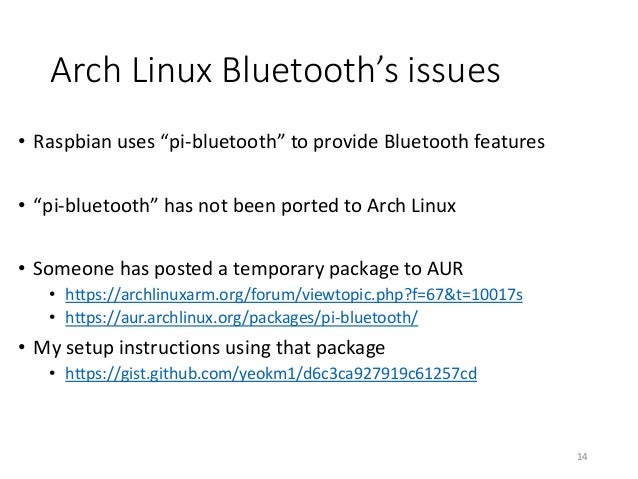Arch Linux Bluetooth Serial Port
Is the bluetooth disabled on the PocketCHIP OS image? Or do I have to control it from the terminal? On the regular chip os it boots to an xfce X session and gives you a gui to control it. Point Of Grace A Christmas Story Rar File here. This isn't available on the pock. How to I connect a raw serial terminal to a bluetooth connection? How to get bluetooth serial port tx/rx buffers. Make a BASIC TAP file readable on Linux. Jan 3, 2018 - Arch Linux Bluetooth Serial Port. - attaching a screen to the Raspberry Pi. - lots of nice cases to protect the Raspberry Pi. Other Peripherals - all sorts of peripherals used with the Raspberry Pi. A note about this page: For USB devices, please specify if they required a powered hub Notes 19-Apr-2012: Now.
Here is my way to proceed to connect to a HC-05 bluetooth device plugged on my arduino. It does not need to write a file like in Brian's answer, but the idea is similar. I've tested it with a baud 9600 rate setup on the HC-05 device. First step: pair the device and provide the PIN I tried to setup from GUI the pairing, but it wasn't working. Here is the command line way to proceed that worked for me.
First, let us pair the device from command line. Run: sudo bluetoothctl Be sure that the bluetooth device is started: # power on We now start the agent that will 'remember the pin' for rfcomm: # agent on Now we enable the scan mode to find our device and be able to pair it: # scan on After a few seconds the MAC of your device should appear. We will denote it as after. Then, you just need to pair the device like this: # pair You will be asked to type a PIN, by default it's 1234 on my HC-05 device. You can note that it's possible that you device connect then disconnect with a message like that: [CHG] Device 20:16:10:24:29:77 UUIDs: 000-1000-8000-00805f9b34fb [CHG] Device 20:16:10:24:29:77 ServicesResolved: yes [CHG] Device 20:16:10:24:29:77 Paired: yes Pairing successful [CHG] Device 20:16:10:24:29:77 ServicesResolved: no [CHG] Device 20:16:10:24:29:77 Connected: no but it's not a problem.


You do not need to connect, so you can now quit bluetoothctl by typing Ctrl + D. Provide a usable file /def/rfcomm0 Firstly, be sure that you didn't run any rfcomm command before. Indeed, even if you close with Ctrl+C the program, it still run in background. Sudo killall rfcomm Now, you can run sudo rfcomm connect /dev/rfcomm0 20:16:10:24:29:77 1 & Note that if you try to write on the input of rfcom, nothing happened. You need to use another program. Third and last step: write into the /dev/rfcomm0 There are several ways to write on the file, but note that all ways to proceed involve root.
I describe here several programs that can do that (so that you can choose depending on your need or on what is installed on your system for example). If you forget to run the program as root, you may have an error: stty: /dev/rfcomm0: Device or resource busy First option: connect using screen Screen is a very powerfull tool. You can install it (it's always usefull anymore) by using: sudo apt-get install screen and then run sudo screen /dev/rfcomm0 If you forget to run it as root, you will get an error like Aleksander got: [screen is terminating] To quit it, type 'Ctrl A +:exit' Second option: connect using minicom Install it sudo apt-get install minicom and then run sudo minicom -D /dev/rfcomm0 If you forget to run it as root, you will have an error like minicom: cannot open /dev/rfcomm0: Device or resource busy To quit it, type 'Ctrl + A X'. Kz 450 Panasonic Manual For Tgd223. Third option: python script miniterm Download, and run: chmod +x miniterm.py sudo./miniterm.py /dev/rfcomm0 Write directly into the file Firstly run the following command (9600 is the baud rate): sudo stty -F /dev/rfcomm0 cs8 9600 ignbrk -brkint -icrnl -imaxbel -opost -onlcr -isig -icanon -iexten -echo -echoe -echok -echoctl -echoke noflsh -ixon -crtscts Now you can write in this file like in a classic file: sudo su -c 'echo 'message' >/dev/rfcomm0' and in theory read from it using sudo tail -f /dev/rfcomm0 But I don't know read does not work, if any of you have an idea.